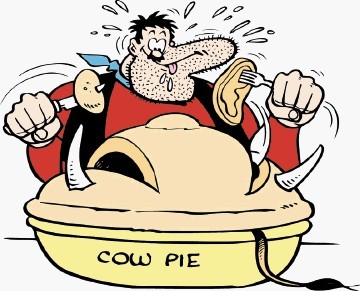
Over the past few weeks there have been numerous articles in the media about the dangers of eating red meat. Some were quite scary with headlines such as “Eating red meat kills!” So where does the truth lie and should we cut back on our consumption of red meat?
The stories all originated from a study carried out in the USA by Harvard School of Public Health (HSPH). The researchers looked at data from two studies of male and female healthcare professionals that took place between 1976 and 2008. Every four years they assessed health and lifestyle information collected from food questionnaires that had been sent out to the participants.
They compared the diets of those who were free of cancer and heart disease and those who had died. The researchers took into account other factors such as weight, physical activity levels, family history, age and so-on.
They also modelled the impact on death rates if one daily serving of red meat was replaced with alternative foodstuff including fish, chicken and nuts.
The researchers concluded that the regular consumption of red meat and particularly processed meat such as bacon and sausages is associated with increased risk of death due to any cause as well as heart disease and cancer. They suggested that substituting red meat with another protein lowers that risk.
At this stage you may be wondering what it is about red meat that presents these risks? The researchers considered that this is partly explained by the presence of saturated fats and iron in red meat and these risks are increased by constituents such as nitrates and sodium found in processed meats.
They also noted that some of the compounds found in red meat are potentially carcinogenic when cooked at high temperatures.
So what should we do? If you have a physically demanding job in a harsh environment such as working offshore, you could well look forward to tucking into a tasty and satisfying hot meal containing red meat. The idea of giving up roast beef, bacon and sausages just does not chime.
The trick is to include red meat as part of a balanced diet and if you think you are eating too much then try replacing it more often with fish, chicken, nuts or legumes. You might even find that you lose a bit of weight.
Try cutting back on eating red meats and look on processed meats such as bacon, sausages and burgers as occasional treats.
Now we have the tricky question of just how much red meat should we be eating?
There is some consensus among nutrition experts that we should be eating very little red meat. However, last year the Scientific Advisory Commission on Nutrition issued guidelines on the consumption of red meat that seem sensible and not too forbidding.
They advised to consume on average no more than 70g (2.5oz) of red meat a day, that’s about 500g (17oz) a week.
This is the equivalent of three slices of ham, one lamb chop or two slices of roast beef a day and that doesn’t seem too restrictive at all. However, a large Sunday roast would be twice the daily limit as would a full cooked breakfast with sausages, bacon . . . the lot.
It’s definitely worthwhile watching your consumption of red meat and why not try having leaner cuts and using cooking methods such as grilling. If you are eating processed meats several times a week, then enjoy a bit of variety and switch to fish or chicken now and then. You could even branch out and try some vegetarian products such as veggie sausages.
If you would like to learn more about the study which has started this current red meat media frenzy, then you can read about it as follows:
“Red Meat Consumption and Mortality,” An Pan, Qi Sun, Adam M. Bernstein, Matthias B. Schulze, JoAnn E. Manson, Meir J. Stampfer, Walter C. Willett, Frank B. Hu, Archives of Internal Medicine, online March 12, 2012.
Kelly Paterson is an occupational health advisor/health promotion nurse at Abermed